Another crazy week in the world of EVs, with lots of announcements on the automaker and battery front. The reveals of the Canoo pickup and Kia EV6 have heads turning and yet another automaker, BMW-owned Mini this time announced plans that it would only produce battery-electric vehicles from 2030. And EV straggler Honda shed a bit more light on its upcoming EVs built on GM’s Ultium battery and powertrain platform.
Automakers and Models
Canoo’s 200-Mile Electric Pickup is Compact Truck With A Full-Size Bed – Canoo (GOEV), the California-based EV start-up revealed its electric pickup with an estimated 200-mile range. The as-of-yet unnamed truck will be offered in dual- or rear-motor configurations, with output ranging up to 600 horsepower and 550 pound-feet of torque. The pickup truck, takes cab-forward packaging to an extreme, with no need for a large engine bay and the driver’s seat essentially over the front wheels.
At about 184 inches long, but riding on a 112.2-inch wheelbase, the Canoo is roughly the same length as compact pickups were more than 20 years ago—when the engine bay was part of the packaging. So without the long hood, there’s actually a lot of space for the cab and bed. The Canoo pickup truck is claimed to have a payload of up to 1,800 pounds, and it can fit the often-cited 4×8 sheet of plywood. According to the company, the pickup will be open for pre-orders in the second quarter of 2021, with deliveries starting “as early as 2023.” – March 10, via Green Car Reports
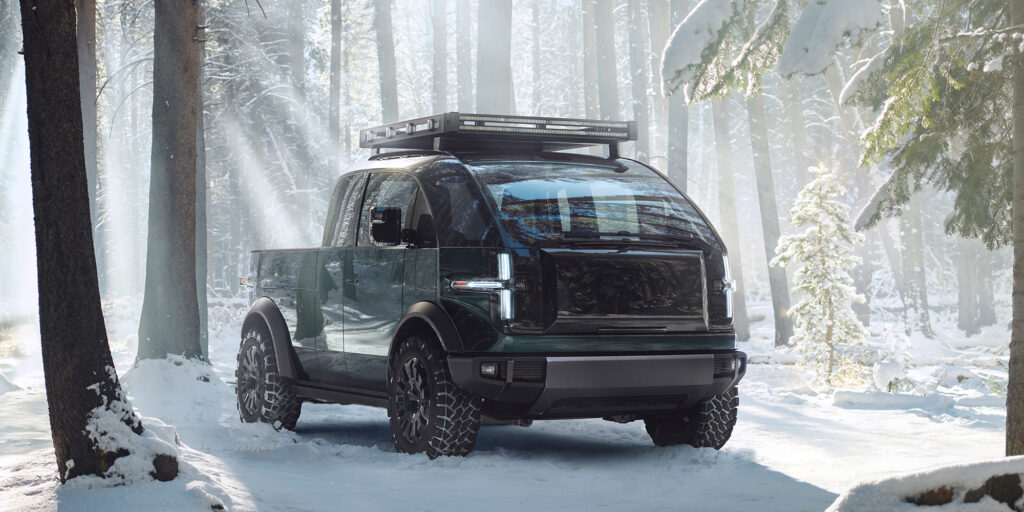
Honda of America plans to sell 2 fully electric SUVs in 2024, Based on GM’s Ultium Platform – Honda confirmed plans to sell two all-electric SUVs in the US for the 2024 model year, and it soon will offer hybrid gas-electric versions of its top-selling models. Honda of America sales chief Dave Gardner told reporters one of the electric SUVs will be from the Honda brand, while the other will be an Acura. Honda will offer more details later this year, he said. It has been known for a year that Honda would produce two BEVs based on GM’s Ultimum powertrain platform, but we now have confirmation of model type (SUVs), brands (Honda and Acura), and timing (likely late 2023 and sold as 2024 models). – March 12, via Associated Press

BMW’s Mini brand will go all-electric by 2030, report says – BMW’s Mini brand will go all-electric from 2030 as the automaker intensifies its transition to battery-powered vehicles, according to people familiar with the matter. The iconic British brand will roll out its last combustion-engine variant in 2025, and around half of all Mini sales should be electric by 2027, one of the people said, declining to be named discussing confidential information.
Mini will only produce battery-electric vehicles from 2030, the people said. BMW CEO Officer Oliver Zipse is set to announce the plan alongside its annual report on March 17, the person said. – March 12, via Automotive News Europe
Toyota Teases New X Prologue BEV – The world’s biggest automaker has teased its first ever global electric vehicle (EV) with a sneak picture ahead of the March 17 launch. The X Prologue will be the first Toyota EV concept released outside China. The link to the reveal was posted only on its European site, which may indicate that its first production EV outside China will be available only in Europe. – March 10, via Forbes
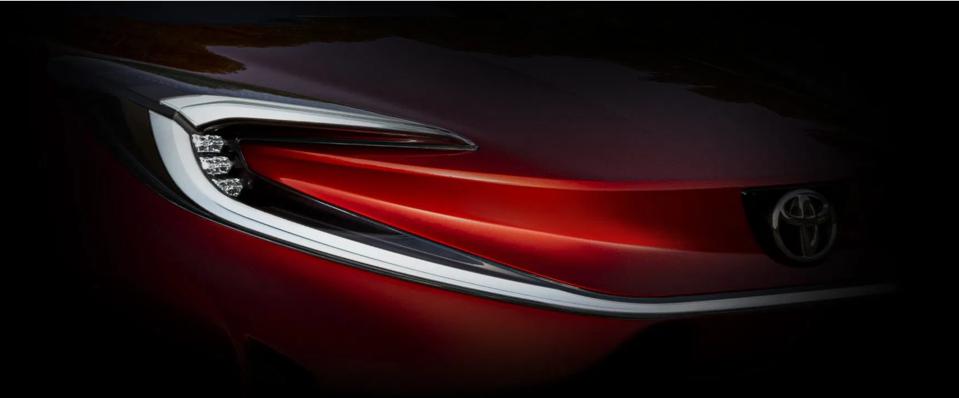
Alpha Motor EV Startup Reveals Wolf Small Pickup – Irvine, CA-based EV startup Alpha Motor revealed (CGI rendering) its planned small electric pickup, named Wolf that conjures up memories of the Chevrolet Luv (of which I owned as a teenager) and Datsun 620. Alpha plans to offer the Wolf in single-motor, front-wheel-drive and dual-motor, all-wheel-drive configurations. Alpha estimates 250-275 miles of range, and 0-60 mph acceleration in 6.2 seconds. Full pricing is expected to run between $36,000 and $46,000 with deliveries promised to start in 2023. – March 14, via MotorAuthority
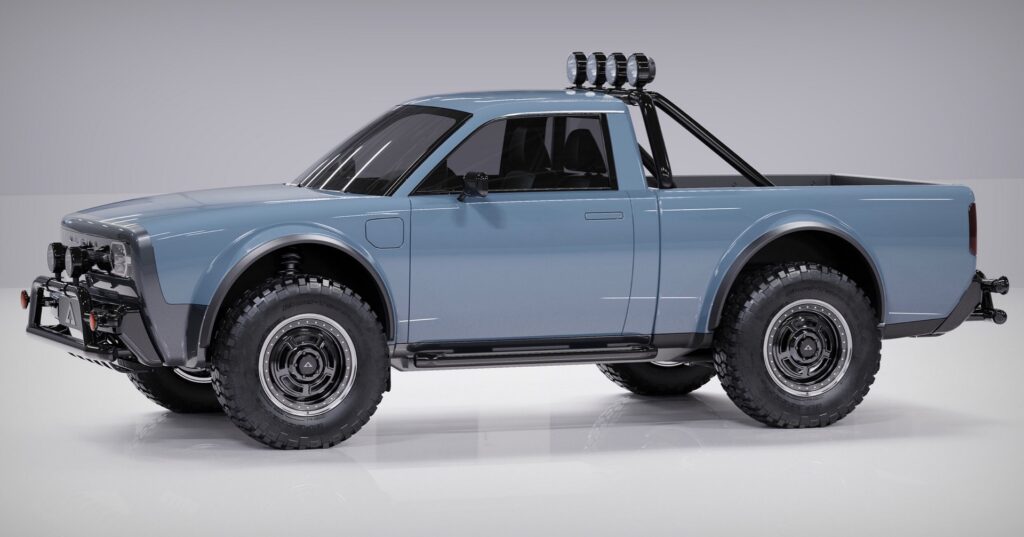
Mullen Technologies aims to bring more than 400 jobs to Memphis, invest $336 million – Electric vehicle manufacturer Mullen Technologies is looking to expand into Memphis, creating more than 400 jobs in the process. The California-based startup plans to spend more than $336 million setting up shop in Memphis, with the majority of that investment, about $299 million, being spent on equipment.
Mullen will also spend about $26 million renovating the building at the site, which was formerly inhabited by Nike but has been vacant for the past five years. The company recently executed a purchase and sales agreement on an engineering facility in Tunica, according to Yahoo! Finance. That facility was previously used by electric car manufacturer Green Tech Automotive. – March 12, via Commercial Appeal
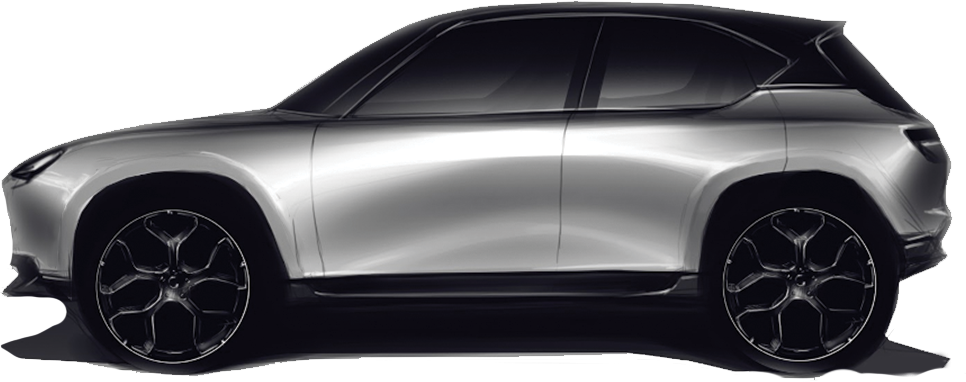
Kia Reveals Images of New EV6 300-mile Range Crossover – Kia released photos of its first dedicated electric car, the 2022 Kia EV6 that debuts a new platform and design language, and is expected to arrive in the United States later this year. Unlike Kia’s other electric vehicles to date, the EV6 (which was called ‘CV’ while under development) isn’t based on an existing internal-combustion or hybrid model. It’s the first Kia to the use the modular E-GMP platform, which is designed specifically for EVs, and will be shared with Kia parent Hyundai, its Ioniq EV brand, and the Genesis luxury brand.
In a press release, Kia called the exterior design “crossover inspired,” but the EV6’s sleek lines are still quite car-like. However, given the current popularity of crossovers, the inclusion of at least some crossover DNA was likely necessary from a marketing perspective. Full specifications won’t be revealed until later this month, but previous reports pointed to a 300-mile range and 20-minute fast charging, thanks to a version of the multi-charging system from the Ioniq 5 crossover also built on the E-GMP platform. – March 15, Green Car Reports
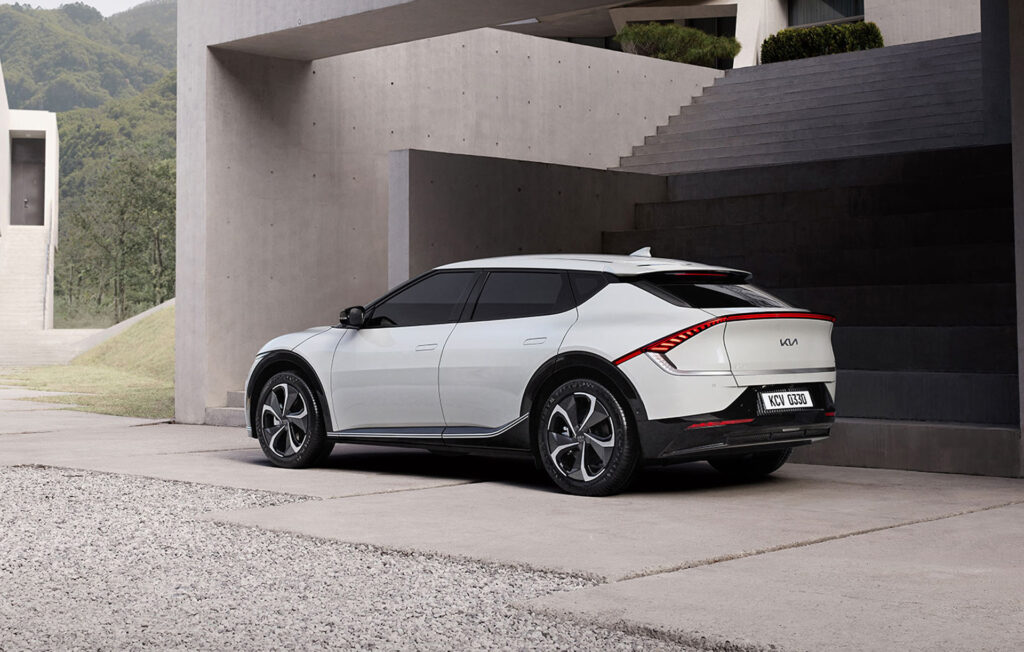
Batteries and Charging
GM To Develop Solid State Batteries With SolidEnergy Systems – General Motors has signed a deal with a Massachusetts Institute of Technology spinout for joint development of next-generation electric vehicle batteries that are expected to cut the cost of the technology by 60%. The tie-up with Singapore-based SolidEnergy Systems, which was founded by MIT grad Qichao Hu, is focused on new battery chemistry to reduce the size of the batteries while increasing an EV’s range.
As part of the deal, GM and SolidEnergy Systems plan to build a prototype production line in Woburn, Massachusetts, for a “high-capacity, pre-production battery by 2023.” – March 11, via CNBC
6 US Utility Companies Plan EV Charging Network In Southern States – Six major utility companies in the US are joining forces to create a new EV charging network on major highways along the Atlantic coast, throughout the Midwest, and in many Southern states. Together they have formed the Electric Highway Coalition to provide electric car drivers with a seamless network of DC fast charging stations that spans their respective service areas. The chargers will be located in places where travelers will be able to rest and relax while their cars are connected to the chargers. The members of the coalition are American Electric Power, Dominion Energy, Duke Energy, Entergy Corporation, Southern Company, and the Tennessee Valley Authority.- March 14, via CleanTechnica
LG suggests building EV battery factory in Georgia, report says – LG Energy Solution suggested that it could build a factory in the U.S. state of Georgia to manufacture batteries for electric vehicles, an official at the South Korean battery maker said on Saturday. In a letter to U.S. Sen. Raphael Warnock, LG Energy Solution CEO Kim Jong-hyun said that “the company is prepared to do whatever we can to help the people and workers of Georgia,” according to The Atlanta Journal-Constitution.
The wholly owned unit of LG Chem confirmed that the company had recently sent the letter to the senator, but declined to confirm the details. Kim also said in the letter that if an outside investor acquires a separate SK Innovation plant in Georgia, LG could partner with it to run the facility, the newspaper reported. – March 13, via Automotive News (may require subscription
LG to invest $4.5 billion in U.S. battery production through 2025 – LG Energy Solution said Thursday it plans to invest more than $4.5 billion in its U.S. battery production business through 2025 and add 4,000 jobs as it considers building at least two new U.S. plants, a company executive told reporters.
The South Korean supplier, a unit of LG Chem, said the investment will result in an additional 70 gigawatt-hours of U.S. battery production capacity. The company declined to say where in the United States it is considering a new battery manufacturing plant. – March 11, via Reuters/Automotive News
Volkswagen Increases Stake In Northvolt And Acquires Joint Venture – The Volkswagen Group is increasing its ownership in Northvolt (from initially planned 20% to an undisclosed level) and acquires Northvolt shares in a 50/50 joint venture “Northvolt Zwei” in Salzgitter, Germany. The “Northvolt Zwei” plant (under development), located at one of Volkswagen’s sites, was planned for 16 GWh annually (with potential for 24 GWh annually). The new target for Volkswagen’s in-house battery cell plant is up to 40 GWh.
Northvolt’s Northvolt Ett plant in Skellefteå, Sweden will start battery cell production for Volkswagen in 2023, with a target of up to 40 GWh annually. Northvolt announced that the German manufacturer has placed a $14 billion battery cell order for this site (over the next 10 years) and that Northvolt will be Volkswagen’s “strategic lead supplier for premium battery cells.” Volkswagen intends to start production of “the unified cell for the high-volume segment” in Salzgitter in 2025. – March 15, via InsideEVs
Regulations and Legislation
Death rattle of the internal combustion engine sparks a political battle – A nine-country coalition led by the Netherlands and Denmark called on the European Commission to decide on a phaseout date for the internal combustion engine as part of efforts to curb emissions and put the bloc on track to meet its climate targets. Austria, Belgium, Greece, Ireland, Lithuania, Luxembourg and Malta also signed up.
“Ambitious policies and regulations — as setting a clear and unambiguous phaseout date for petrol and diesel cars and vans and stricter CO2 standards — will also provide predictability for the automotive sector and spur the transition towards zero-emission mobility,” said the statement. – March 10, Politico
Auto industry urges emissions deal weaker than Obama’s – A coalition of automakers has told the Biden administration it would agree to raise mileage standards to reduce tailpipe emissions but with tradeoffs and at rates lower than those brokered by California with five other car manufacturers.
Under the plan, automakers would agree to stricter standards in exchange for a “multiplier” that would give them additional credit toward meeting the standards if they sell more electric vehicles, three people with knowledge of the talks said. The deal would incentivize automakers to get more electric vehicles on the road, thereby reducing pollution, said the people, who spoke to The Associated Press on condition of anonymity to reveal internal negotiations. – March 12, via Associated Press

